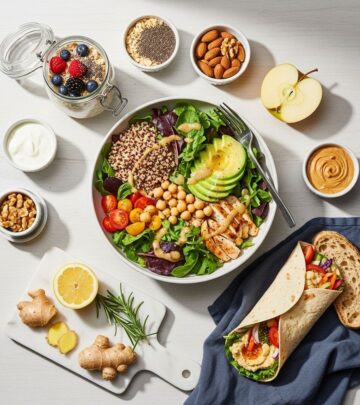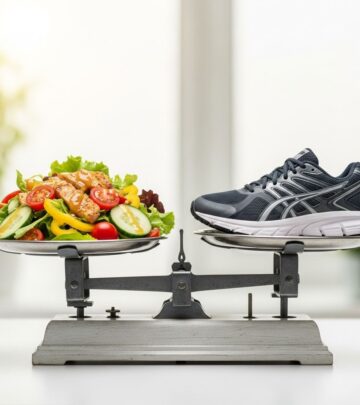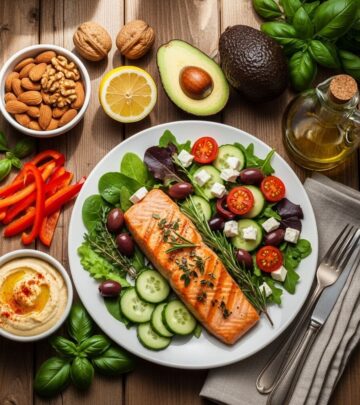A Complete High-Protein Mediterranean Diet Meal Plan
Energize your routine with nutrient-packed dishes inspired by coastal flavors daily!

High-Protein Mediterranean Diet Meal Plan
The High-Protein Mediterranean Diet blends the age-old nutritional wisdom of the Mediterranean region with modern protein-packed foods to offer an energizing, flavorful, and health-boosting approach. This meal plan is designed for anyone seeking to support muscle strength, improve satiety, and reap the heart and longevity benefits for which the Mediterranean way of eating is famous.
What Is a High-Protein Mediterranean Diet?
Traditionally, the Mediterranean diet emphasizes vegetables, fruits, whole grains, legumes, nuts, seeds, olive oil, herbs, and seafood. A high-protein variant elevates protein intake, primarily through lean meats, fish, eggs, low-fat dairy, and plant protein sources such as beans and lentils, still anchored in the classic Mediterranean philosophy of moderation and variety.
- Greater focus on fish, poultry, lean meats, legumes, and low-fat dairy as protein sources.
- Still prioritizes olive oil, vegetables, fruits, whole grains, nuts, and seeds.
- Limits processed foods, high-sugar snacks, and saturated fats.
Main Benefits of the High-Protein Mediterranean Diet
- Supports muscle maintenance and growth—vital for active lifestyles, healthy aging, and weight management.
- Boosts satiety and helps control appetite, supporting healthy weight loss or weight maintenance.
- Improves heart health through healthy fats and fiber-rich foods, lowering LDL cholesterol while providing sustained energy.
- May reduce risk of chronic diseases including type 2 diabetes, some cancers, and metabolic syndrome, thanks to antioxidants and anti-inflammatory compounds from plant foods.
- Balanced nutrition: Maintains an optimal macronutrient ratio (Protein ~25%, Fat ~30%, Carbs ~40%) for most adults.
High-Protein Mediterranean Diet Grocery List
Planning your weekly meals is easier with a comprehensive shopping list. This high-protein Mediterranean menu includes:
- Dairy & Eggs: Greek yogurt, feta cheese, cottage cheese, eggs
- Meat, Fish & Poultry: Chicken breast, salmon, tuna, shrimp
- Plant Proteins: Lentils, chickpeas, white beans, quinoa
- Fresh Produce: Mixed greens, tomatoes, cucumbers, spinach, carrots, asparagus, lemon, peaches, Mediterranean vegetables (eggplant, zucchini, bell peppers)
- Dry Goods: Quinoa, whole grain bread, walnuts, almonds, pine nuts
- Snacks & Condiments: Hummus, olives, olive oil, honey
- Beverages: Unsweetened almond milk, soy milk, skim milk, Greek yogurt smoothies, water, herbal teas
Essential Foods & Nutrient Highlights
| Food | Protein (per serving) | Key Nutrients |
|---|---|---|
| Greek yogurt | ~15g (per cup) | Calcium, probiotics, vitamin B12 |
| Chicken breast | ~26g (per 3 oz) | Lean protein, selenium |
| Lentils | ~9g (per 1/2 cup cooked) | Iron, folate, fiber |
| Salmon | ~21g (per 3 oz) | Omega-3s, vitamin D |
| Eggs | ~6g (per large egg) | Choline, lutein, vitamin A |
| Almonds | ~6g (per 1 oz) | Vitamin E, magnesium |
| Quinoa | ~8g (per 1 cup cooked) | Complete protein, manganese |
Sample High-Protein Mediterranean Meal Plan: 2 Days
Day 1
- Breakfast: Greek yogurt with honey and walnuts (300 cal, 20g protein, 25g carbs, 10g fat)
- Lunch: Grilled chicken salad with mixed greens, olives, tomatoes, and feta (400 cal, 35g protein, 15g carbs, 20g fat)
- Snack: Hummus with carrot and cucumber sticks (150 cal, 8g protein, 15g carbs, 8g fat)
- Dinner: Baked salmon with steamed asparagus and quinoa (500 cal, 40g protein, 30g carbs, 20g fat)
Day 2
- Breakfast: Scrambled eggs with spinach, whole grain toast (350 cal, 25g protein, 30g carbs, 15g fat)
- Lunch: Tuna salad with mixed greens, cherry tomatoes, lemon-olive oil dressing (350 cal, 30g protein, 10g carbs, 20g fat)
- Snack: A handful of almonds (180 cal, 6g protein, 6g carbs, 16g fat)
- Dinner: Grilled shrimp with roasted Mediterranean vegetables (400 cal, 35g protein, 20g carbs, 18g fat)
Other High-Protein Mediterranean Snacks
- Greek yogurt with almonds
- Grilled halloumi cheese with roasted veggies
- Tuna salad on cucumber slices
- Lentil & vegetable soup
- Boiled eggs with olive tapenade
- Quinoa salad with feta and olives
- Chickpea hummus with carrot sticks
Tips to Get More Protein—Mediterranean Style
- Include a protein source at every meal: eggs, Greek yogurt, beans, or lean fish/chicken.
- Mix plant and animal proteins for a diverse amino acid profile.
- Snack smart: Nuts, seeds, or yogurt between meals keep you energized.
- Bulk up salads with beans, lentils, or diced cooked chicken breast.
- Choose whole grains (quinoa, farro) with higher protein over refined grains.
- Use whey protein or Greek yogurt in smoothies and shakes for an on-the-go protein boost.
- Season liberally with Mediterranean herbs and spices (oregano, basil, cumin, paprika) for flavor without excess salt.
Why High-Protein Mediterranean?—The Science
Protein is a key macronutrient for muscle repair, immunological strength, metabolic health, and satiety. Combined with the Mediterranean focus on minimally processed, plant-rich foods and healthy fats (especially olive oil), the result is an eating pattern shown to:
- Decrease cardiovascular risk and lower blood pressure
- Delay age-related muscle loss (sarcopenia)
- Improve blood glucose control and weight management by boosting fullness and reducing cravings
- Support gut health via fiber, probiotics, and polyphenols
Studies show that high-protein diets can help burn more calories throughout the day and reduce the risk of overeating, especially when paired with ample vegetables and whole foods.
How to Budget for a High-Protein Mediterranean Meal Plan
- Buy protein sources in bulk: Eggs, beans, and lentils are affordable and versatile.
- Opt for frozen fish and vegetables to save money while retaining nutrients.
- Plan meals ahead and make use of leftovers, such as cooked chicken in salads or beans in soup.
- Shop for seasonal produce and check for grocery store specials.
- Batch-cook grains and legumes for use in multiple meals during the week.
Packed with Antioxidants and Micronutrients
The high-protein Mediterranean plan is also loaded with vitamins, minerals, and phytonutrients from a range of colorful fruits, vegetables, nuts, and seeds. This natural diversity supports immunity, digestion, and overall well-being. For example:
- Pine nuts, walnuts, olive oil: Heart-healthy polyunsaturated and monounsaturated fats
- Asparagus, broccoli, spinach: Fiber, folate, vitamin K, magnesium
- Peaches, berries, tomatoes: Antioxidant vitamins C and A
Frequently Asked Questions (FAQs)
Q: Can vegetarians follow a high-protein Mediterranean diet?
A: Yes. Focus on plant proteins like legumes, lentils, chickpeas, tofu, eggs, Greek yogurt, and cottage cheese while still enjoying Mediterranean vegetables, grains, fruits, and healthy fats.
Q: How does this plan compare with a traditional Mediterranean diet?
A: The core elements are the same, but this plan increases protein intake and focuses more on lean sources such as chicken, fish, eggs, and plant proteins, while continuing to limit red and processed meats.
Q: Can I use this plan for weight loss?
A: Yes. Increased protein helps manage appetite, build/maintain muscle, and may enhance fat loss when combined with overall healthy Mediterranean eating and portion control. However, calorie awareness is still important for weight loss.
Q: What nutrients might I need to pay special attention to?
A: Most common nutrients are well represented. Vegetarians may need to monitor iron and B12 intake. High-protein eaters should hydrate well, and those on strict low-carb plans should ensure sufficient fiber from vegetables and legumes.
Q: Are processed protein snacks recommended?
A: Minimize ultraprocessed snacks and bars. Whenever possible, opt for basic foods: eggs, Greek yogurt, nuts, hummus, or simply prepared meats, fish, or legumes.
Q: Is this meal plan suitable for people with diabetes or cardiovascular disease?
A: The Mediterranean diet is generally beneficial for blood sugar, blood pressure, and heart health. The high-protein variation can be safe and helpful, especially when paired with whole foods. Those with health conditions should always consult with a healthcare provider before major dietary changes.
Extra Tips to Make the Most of Your High-Protein Mediterranean Diet
- Batch-cook proteins: Grill or bake several chicken breasts, cook a pot of lentils, or roast a tray of chickpeas to have handy for quick meals.
- Mix up your seafood: Enjoy different fish (salmon, trout, sardines, shrimp) each week to keep meals interesting and nutrient-rich.
- Pay attention to portions—aim for a palm-sized portion of protein at main meals, balanced with generous servings of vegetables and wholesome fats.
- Use herbs, lemon, and vinegar to keep meals bright without added salt or heavy dressings.
- For meal prepping, make a big batch of whole grains, chop vegetables for salads, and store yogurt-based sauces for easy access.
Sample High-Protein Mediterranean Meal Plan: Menu for the Week
The following is a flexible week-long menu with protein-packed, Mediterranean-inspired recipes. Adapt portions and recipes based on your personal needs and preferences:
- Monday
Breakfast: Greek yogurt with strawberries and chia seeds
Lunch: Whole grain sandwich with hummus and vegetables
Dinner: Tuna salad with greens, olive oil, and fruit salad - Tuesday
Breakfast: Oatmeal with blueberries
Lunch: Caprese zucchini noodles with mozzarella and tomatoes
Dinner: Salad with tomatoes, olives, cucumbers, farro, baked trout, and feta cheese - Wednesday
Breakfast: Omelet with mushrooms, tomatoes, onions
Lunch: Whole grain sandwich with cheese and vegetables
Dinner: Mediterranean lasagna - Thursday
Breakfast: Yogurt with sliced fruit and nuts
Lunch: Quinoa salad with chickpeas
Dinner: Broiled salmon with brown rice and vegetables - Friday
Breakfast: Eggs and sautéed vegetables with whole wheat toast
Lunch: Stuffed zucchini boats with turkey sausage and cheese
Dinner: Grilled lamb with salad and baked potato - Saturday
Breakfast: Oatmeal with nuts and apple
Lunch: Lentil salad with feta, tomatoes, cucumbers, olives
Dinner: Mediterranean pizza on whole wheat pita with cheese, vegetables, olives - Sunday
Breakfast: Omelet with vegetables and olives
Lunch: Falafel bowl with feta, onions, tomatoes, hummus, and rice
Dinner: Grilled chicken with vegetables, sweet potato fries, and fruit
Conclusion: Eat Well, Feel Strong
Combining the heart and soul of Mediterranean living with the power of high-protein foods delivers a meal plan that is satisfying, energizing, and enjoyable. Whether your goal is improved health, weight management, or simply delicious variety, a high-protein Mediterranean diet provides endless inspiration for every meal of the day.
Read full bio of medha deb












